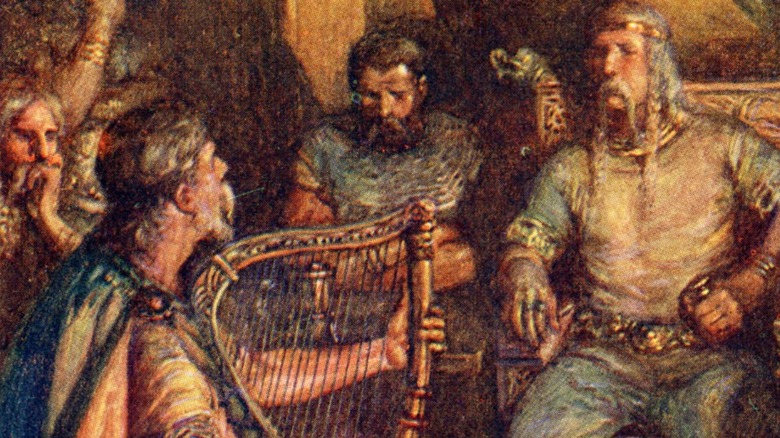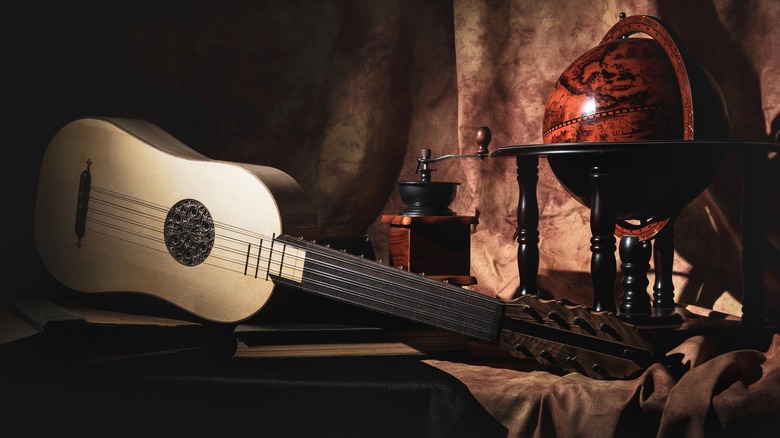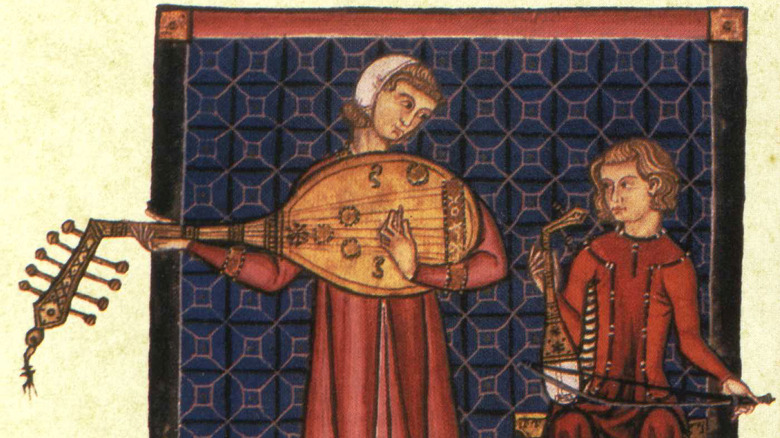Did Medieval Bards Really Exist?
We'd rather not start this article with a dated "Coin to Your Witcher" meme reference, but heck, it might be the newest pop culturally-spawned image of a "bard" that we can all envision. Grotty, vaguely "medieval" tavern? Check. Unwashed masses glugging away their sad, mud-spattered lives into an alcoholic oblivion? Check. Goofy kind of entertainer-singer guy in a puffy-shouldered costume? Check. Is this a bard, then? Or a minstrel? A troubadour? Or just some lute-less, lyre-less dude making up singable ditties for illiterate peasants?
Herein lies the problem: Medieval "bards" are even more vaguely defined and poorly understood than medieval knights. Folks who play Dungeons and Dragons, or those who've idled away their hours with RPGs, will have no problem envisioning a waggish, smarmy, bardic image. But aside from such romantic fantasies, what do we really know about bards?
A couple of things right away: First, we've got to limit our discussion to the U.K. and medieval Europe, landmasses stuffed with a wealth of cultures and nations. Second, "medieval" refers to a period of about 1,000 years, from the fall of the Roman Empire in 476 C.E. to the beginning of the Renaissance in the 14th century, per History; there's absolutely no way to talk with precision about how bardic practices evolved over that entire time. Third, kings and popes, not peasants tucked into the recesses of country inns, litter historical documents. Finally, as Britannica says, the somewhat hazy distinction between bard and poet ultimately boils down to music.
A skilled poet of the Renaissance
The modern meaning of "bard" differs from its original use. Starting in the early 16th century, as Medieval Life and Times says, a "bard" in the U.K. was anybody who was a skilled wordsmith or poet (like Shakespeare, "the bard"). Or, as Britannica puts it, a bard was a "tribal poet-singer gifted in composing and reciting verses on heroes and their deeds." In other words, a bard wasn't a specific profession like "associate executive director to the blah blah." The title was used in a non-specific way to describe people who told certain kinds of stories under certain conditions, professionally or not.
This more loosey-goosey meaning seems to have started around the beginning of the Renaissance. Austrian poet and composer Oswald von Wolkenstein, for instance, came from a rich family and set out to wander at age 10, as Hoasm states. He was educated, and could read, write, and understand music theory. He and his brothers got an inheritance in 1407, and Wolkenstein became an attaché to the German king, later turned emperor, Sigismund, in 1415. Wolkenstein followed the king around, and sometime after 1432, retired to his estate and gave up the whole music thing.
Around the same time, the French poet Francois Villon (born 1431, per the Poetry Foundation) led a wandering, moneyless life of stories and music that he bemoaned in his work. Both he and Wolkenstein were "bards," but with very different fortunes and life paths.
A Celtic poetic profession
The National Trust, a U.K.-based charity, tells us that bards, or "beirdd," can be traced back to ancient Wales. There's evidence for an official, hereditary bardic profession going all the way back to the 6th century Welsh Celts. It's reasonable to assume that the role spread out to nearby countries and adopted its more modern use over time. In Scotland, for instance, as Medieval Life and Times tells us, bards were considered low social annoyances, as opposed to composers of lofty poetry in England.
Welsh bards learned orally, from teacher to student, and had to know and remember a vast compendium of historical information. They took this knowledge and combined it with specific poetic meters to develop tales that covered everything from victories over foes to the recitation of law, stories of heroes to recalling family histories. There are even specific locations in Wales associated with bardic history. The mountain Cadair Idris in South Snowdonia (picture above) is said to make "a bard or a madman" out of those who sleep overnight on its peak. This legend was written down for the first time by the scholar Siôn Dafydd Rhys (1534-1609 CE). Bardic poetry has been found much earlier than that, though, like at the court of castle Dinefwr (significant in the 12th century, per CADW). Welsh poet Iolo Morganwg (1747–1826 C.E.) even created the "Gorsedd of the Bards of the Island of Britain," a revivalist organization that created full-on bardic rituals and costumes.
Kin to minstrels and troubadours
A brief history of bards wouldn't be complete without a look at two bardic contemporaries: minstrels and troubadours.
Minstrels, as Britannica says, were a more general type of entertainer, specifically one who traveled from place to place. Think of a troupe of somewhat low-brow jugglers, tumblers, storytellers, and musicians, and you've got an accurate idea of what minstrels were. Minstrels operated more on continental Europe than the U.K., from the 12th to 17th centuries. By the 14th and 15th centuries there were official minstrel guilds (professional associations) all over Europe. Outdoor performances to large crowds were the norm, and troupes could get wealthy on commissions from nobles. A lot of minstrel music was improv, and because minstrels were typically illiterate, not much of their work was written down.
Troubadours, by contrast (and as Britannica also tells us), flourished earlier, from the 11th to 13th centuries. Troubadours were part of a specific cultural lineage of lyric poets — dramatic, emotional narratives — from the region of southern France, northern Spain, and northern Italy. They more often played not to large crowds of commoners, but in courtly settings among the aristocracy. They were given pretty wide berths to voice their opinions, and were sometimes politically influential as a result. The word "troubadour" comes from the old Occitanian (French precursor language) verb "trobar," meaning "to find" or "to invent." This means troubadours were valued for writing new poetry, but according to specific meters and structures.



